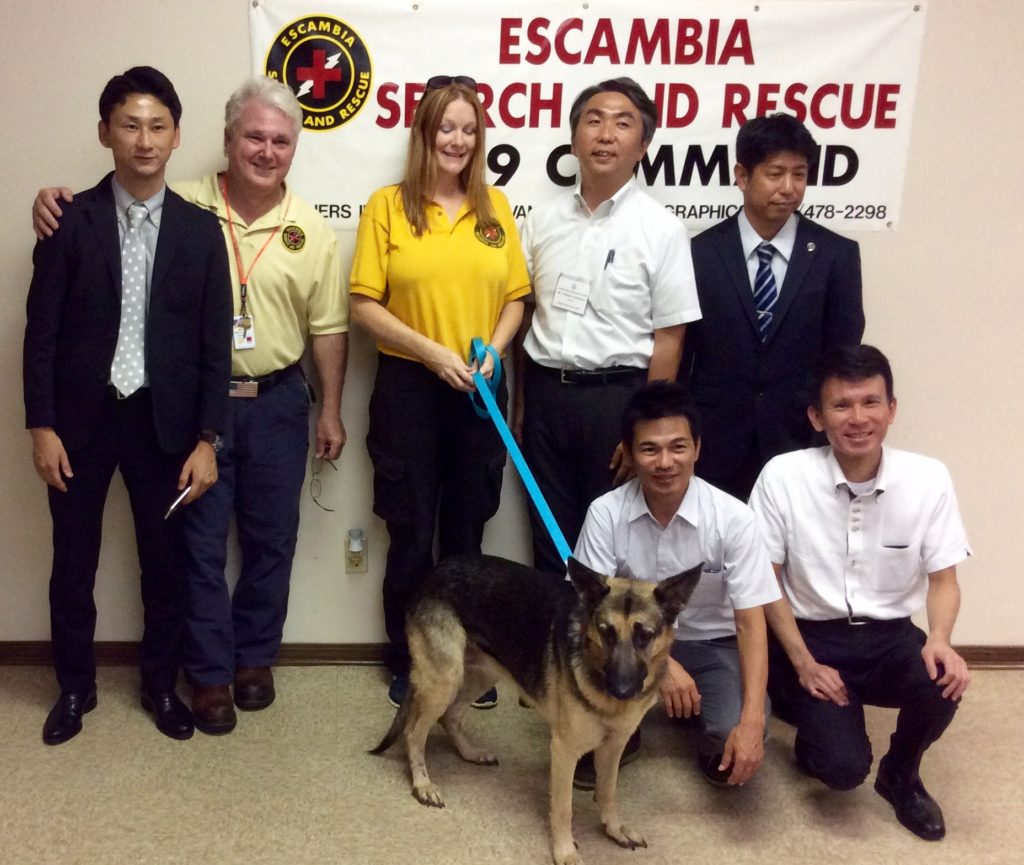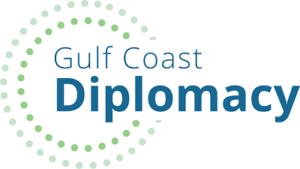This summer, a group of five visitors from Japan arrived in Pensacola as part of an U.S. State Department International Visitor Leadership Program (IVLP) project titled Issues Facing Base Hosting Communities. The professional objectives of the national project were “to underscore the strategic nature of U.S. bases in Japan and how they support the development of joint, interagency, and multinational capabilities; to examine the Okinawa Consolidation Plan, the U.S. Defense Policy Review Initiative, and other ongoing policy discussions that affect base land returns as well as the strength of U.S. forces in the Pacific; to focus on how U.S. communities constructively interact with bases they host, particularly in regard to environmental concerns, emergencies, and facilitating strong, positive relationships; to examine how local governments are working with bases regarding disaster preparedness; to highlight the economic benefits and challenges military installations bring; and to share how American news agencies engage in advocacy journalism while remaining objective and maintaining their appeal to mainstream audiences.”
The group first had a welcome orientation at Pensacola City Hall where they met and asked questions of a local elected official, Dr. P.C. Wu. From there they traveled to the Greater Pensacola Chamber of Commerce to meet with Debi Graham, Jeff DeWeese, Sergeant Jimmy Donohoe, RADM Don Quinn, Todd Thomson, and Jack Williams of the Military Affairs Committee. This discussion highlighting the importance of cultivating a relationship of trust and communication between military and civilian communities continued at the Escambia County Sheriff’s Office where Protocol Officer Allison Morgan spoke about the established protocol for the coordination of law enforcement and military personnel during emergencies.
At the Naval Air Station (NAS) of Pensacola, the visitors met Patrick Nichols, Captain Christopher Martin, Commander Shawn Dominguez, Burt Fenters, Mark Gibson, and Stephanie Oram. As the primary training base for Navy, Marine, and Coast Guard aviators and naval flight officers, NAS Pensacola is “The Cradle of Naval Aviation,” and the visit gave the group a better understanding of cooperation and ties between NAS Pensacola and the wider community. Their time at NAS ended with lunch and exploration at the National Naval Aviation Museum.
To focus on emergency operations, the Japanese met with Escambia Search and Rescue (ESAR) where volunteer Clint Retherford and his colleagues provided an overview of how the group is organized into various commands such as Marine Operations, Land, etc. ESAR volunteers contribute to search and rescue operations in a variety of ways, from boat operation, to vehicle maintenance, to searching the woods for missing persons. This discussion highlighted collaboration between ESAR, local government agencies, and military partners.
On their last day in Pensacola, the group attended a community coffee discussion at Apple Annie’s where they were joined by Kent DeSantis, Ted Howard, and Pamela Schwartz for informal discussion and interaction. This was followed by a site visit to the Escambia County Division of Emergency Management’s Emergency Operations Center where they met Division Manager John Dosh. The Escambia County Division of Emergency Management is the county-level agency responsible for coordinating the regional response to disasters, both man‑made and natural. This highlighted the cooperation between civilian emergency management services and military base personnel in the event of natural disasters or other emergencies and was a great segue into the last meeting of the project, a discussion on military reporting at the Pensacola News Journal with Lisa Nellessen-Lara and Melissa Nelson-Gabriel.
The Gulf Coast Citizen Diplomacy Council thanks all who helped make this project a success and extends special gratitude to members Kasey Jones, Jeremy Ochoa, Andrea Ford, and Allan Ford for welcoming the visitors into their homes for dinners. Special thanks also go to member Susan Senkarik who acted as the Gulf Coast Citizen Diplomacy Council Volunteer Facilitator throughout the IVLP group’s time with us.

